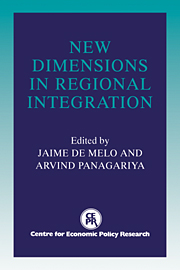Book contents
- Frontmatter
- Contents
- List of figures
- List of tables
- Preface
- Foreword
- Acknowledgements
- List of conference participants
- PART ONE SYSTEMIC ISSUES
- PART TWO COUNTRY ISSUES
- 6 The new regionalism: a country perspective
- Discussion
- 7 The European Community: a case of successful integration?
- Discussion
- 8 Regional integration in Sub-Saharan Africa: past experience and future prospects
- Discussion
- 9 Latin America's integration and the multilateral trading system
- Discussion
- 10 Regional integration in Eastern Europe: prospects for integration within the region and with the European Community
- Discussion
- 11 Regional trade arrangements in North America: CUSTA and NAFTA
- Discussion
- 12 Trading blocs and East Asia
- Discussion
- 13 Prospects for regional integration in the Middle East
- Discussion
- Round Table Discussion
- Index
8 - Regional integration in Sub-Saharan Africa: past experience and future prospects
Published online by Cambridge University Press: 04 May 2010
- Frontmatter
- Contents
- List of figures
- List of tables
- Preface
- Foreword
- Acknowledgements
- List of conference participants
- PART ONE SYSTEMIC ISSUES
- PART TWO COUNTRY ISSUES
- 6 The new regionalism: a country perspective
- Discussion
- 7 The European Community: a case of successful integration?
- Discussion
- 8 Regional integration in Sub-Saharan Africa: past experience and future prospects
- Discussion
- 9 Latin America's integration and the multilateral trading system
- Discussion
- 10 Regional integration in Eastern Europe: prospects for integration within the region and with the European Community
- Discussion
- 11 Regional trade arrangements in North America: CUSTA and NAFTA
- Discussion
- 12 Trading blocs and East Asia
- Discussion
- 13 Prospects for regional integration in the Middle East
- Discussion
- Round Table Discussion
- Index
Summary
Introduction
In the past three decades, a great number of broadly defined regional integration (RI) schemes have been adopted by all countries in Sub-Saharan Africa (SSA). According to some accounts, there are currently over thirty Inter-Governmental Organisations (IGOs) in West Africa alone. The aims of RI schemes in SSA have ranged from limited cooperation among neighbouring countries in specific areas to the creation of an African Common Market. However, within all of SSA, there are at present no more than seven or eight IGOs that aim specifically at fully-fledged economic integration.
The appeal of some form of RI in SSA is almost intuitive. The SSA countries are very small in economic terms. In 1989, the Gross National Product (GNP) of all SSA countries put together was approximately equal to that of Belgium. They are also among the poorest in the world, with a per capita GNP of $340 in 1989 (see Table 8.1), and are very poorly endowed with human and physical capital. Common sense thus dictates that for countries with such characteristics it is economically justified to integrate their markets. Imagine subdividing Belgium into forty-something independent countries, each with its own isolated goods and factor markets, a different public administration, currency, language, fiscal and monetary authorities, army, plus a very inefficient intercountry transportation network. Economists would contend that the welfare of individuals would surely be reduced.
Why, despite the strong common sense appeal of this argument, has RI in SSA so far failed? Does this failure imply that RI as a model of development is harmful or, at best, ineffective for SSA and should be abandoned altogether, even as regionalism in the world appears to be gaining ground against multilateralism?
- Type
- Chapter
- Information
- New Dimensions in Regional Integration , pp. 234 - 271Publisher: Cambridge University PressPrint publication year: 1993
- 30
- Cited by



